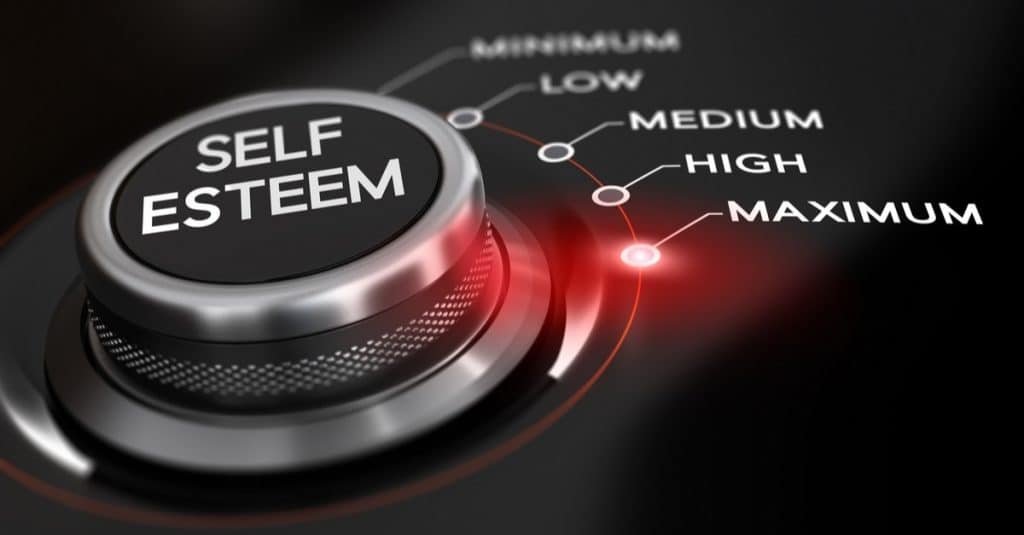Whether or not you’ve been following my posts on this site, you probably already know that self-esteem is your personal evaluation of your value or worth.
Self-esteem goes both ways, and here’s a brief explanation.
Healthy or high self-esteem makes you more confident in your decision-making abilities as well as helps you be more assertive, especially when expressing opinions and needs.
On the flip side, poor or low self-esteem means lacking confidence in who you are and what you can do.
These definitions are great, but from a more practical sense, how can good self esteem help you through difficult situations?
In this article, I share practical ways that healthy self-esteem can be useful, particularly during those times when your circumstances are anything but pleasing and the future seems very bleak.
Difficult Situations Can Affect Your Confidence Level
Certain life events can deal a severe blow to your confidence level. Physical, mental, emotional, and financial trials can leave us shaken and may even taint our perspectives about life.
Here are a few difficult events that many people experience at least once in their lifetimes:
- Repeated failure
- Persistent and severe illnesses
- Mental health issues
- Addiction to drugs, alcohol, or any substance abuse
- Having a baby or raising kids
- Losing your job or not having one, to begin with
- Relocating to a new city or moving home
- Physical, sexual, emotional harassment
- Separation, divorce, or bereavement
- Constant stress
These hard blows can deeply affect us negatively and keep us down for a long time unless we have a healthy dose of personal resilience.
Resilience and good self-esteem work hand in hand, and together, these qualities can help you bounce back from life’s school of hard knocks.
It doesn’t matter if you are currently down and out or facing a series of unexplainable ill-fortune and failures; one thing is certain: you can slowly build back your self-confidence and get through that difficult situation.
It all starts by understanding that your worth doesn’t change, regardless of any situation.
Remember that a crumpled dollar bill is still worth a dollar! The current situation (crumpled or torn bill) doesn’t diminish the money’s worth.
That’s exactly how your worth is – it remains unchanged whether you are bubbling with lots of energy or lying half-dead on a sickbed.
The best way I know to quickly build back your self-confidence is by working on developing a healthy level of self-esteem. It will help you to cope better with difficult situations.
How Can Good Self Esteem Help You Through Difficult Situations?

Talk, they say, is cheap!
It is easy to read about all the qualities associated with self-esteem, but they won’t do much good if you don’t know exactly how to translate them into coping mechanisms for everyday situations.
Here are some important ways that developing healthy self-esteem can help you through challenging periods in your life.
High Self-Esteem Boost Confidence in Your Decisions
People with low self-esteem often find themselves second-guessing nearly every decision they make.
Having self-doubt or second-guessing your decision is not something you want to do if you must get through difficult situations successfully.
High self-esteem is crucial for making life-altering decisions like choosing a life partner or deciding your career path. You also need a decent level of self-esteem to make simple, everyday decisions, such as taking the subway or walking.
It is easy for just about anyone to sway you out of your decisions if you are not clear about what you want. With healthy self-esteem, you put yourself first when making decisions instead of trying to please others at your expense.
Good Self-Esteem Helps You Accept Challenging Situations
Good self-esteem helps you come to terms and make peace with whatever challenging situation you are currently facing.
However, this doesn’t mean you should pretend that everything is fine when it is not.
Adopting a head-in-the-sand approach to difficult situations isn’t an indication of good self-esteem.
If anything, it simply means you are living in denial.
Accepting situations the way they are means you are not wasting your time and energy pushing against something you can’t change.
You embrace the challenge and think of ways to deal with the situation without losing faith in your abilities.
Good self-esteem helps you walk with your shoulders high, even in difficult situations, because you understand that you are not defined by whatever problems or challenges you face.
With healthy self-esteem in place, you know that you are worthy, you value yourself, and you are proud of yourself no matter the situation.
And this fits in nicely with the next point.
Stepping Out of Your Comfort Zone Is a Lot Easier
Healthy self-esteem can make it easier to step out of your comfort zone.
Here’s the deal.
There are two ways you can approach a difficult situation. You can see the situation as a problem or think of it as a challenge.
What’s the difference?
Viewing a difficult situation from the perspective of a problem makes you want to seek ways to avoid the situation instead of facing them head-on.
For example, distracting yourself with excessive alcohol is an easy way to avoid thinking about money problems. It doesn’t solve the problem, but it gives you temporal relief and doesn’t require you to do anything outside the ordinary to challenge yourself.
On the other hand, seeing a difficult situation as a challenge helps you rise to the occasion.
You are more likely to approach the situation as an opportunity for growth and personal development.
For example, making ten extra cold calls per day to help you reach your monthly sales target may be difficult, but you are willing to do it to get the results that will help you out of your money issues.
With good self-esteem, your comfort zone will no longer be a comfortable place to stay. Hiding or shying away from difficult situations will be a thing of the past.
Good Self-Esteem Helps You Focus More on Positive Outcomes
Sometimes we lose faith too easily and believe that things will turn out bad despite our best efforts.
At other times, we can’t seem to shake negative thinking off our minds, no matter how hard we try. Our minds try to convince us that we won’t make any headway every time we set out to undertake something new.
However, when your self-esteem is in a generally good place, you are more likely to focus on the good in everything, even if results don’t turn out as you expected at first.
In other words, temporal setbacks will make you throw your hands up in despair and give up too quickly. Instead, you will see failure, rejection, and negative outcomes as a chance to do things a bit differently.
For example, failing to land a job you were hoping to get can be devastating. Someone with poor self-esteem will likely take the rejection personally and conclude that they are not good enough.
Worse still, they might start to think they won’t get any other job they apply for, especially if the position requires exceptional qualifications.
Having healthy self-esteem can help you see the situation in a different light.
No, it doesn’t mean you won’t feel hurt if you get turned down or even lose your job.
Instead, good self-esteem will help you quickly accept the situation, dust yourself up, and search for better opportunities.
This is a far more productive way to get through the situation than allowing yourself to sink deep into anger, self-blame, self-doubt, and depression – all of which indicate poor self esteem.
High Self-Esteem Helps You Maintain Quality Friendships

We’ve all been in situations where we needed a shoulder to lean on – not just any shoulder will do, though. Quality friends can help us get through some of our most difficult moments.
However, people who allow stress and worries of life to eat away at them will soon find that they’ve also lost the shoulders that could have supported them in difficult times.
Predominantly positive people don’t enjoy spending time with others who drain their energy. And that’s exactly what pessimism does – it drains the energy out of anyone that comes in contact with a person who is negative for the most part.
Having good self-esteem helps you keep your head above the water, so stress and worries don’t affect your strength of character.
The result is that you’ll always keep your good friends and have enough of a support system to weather the storms of life.
Bottom Line
Knowing the textbook definition of self-esteem isn’t really helpful if you can’t see how the quality can give you an edge in life’s ups and downs.
Understanding what the term means is great, but how can good self esteem help you through difficult situations? In what ways can you effectively apply the qualities of good self-esteem to challenging situations?
Hopefully, the tips in this post have answered those questions and helped you understand exactly how to put this quality to work in your everyday situations.
By the way, it is easy to mistake high self-esteem with ego. But there’s a world of difference between these two. Check out this post to learn about these differences.




